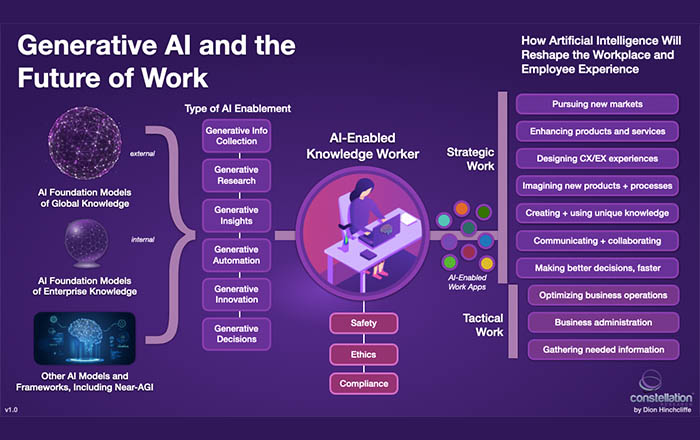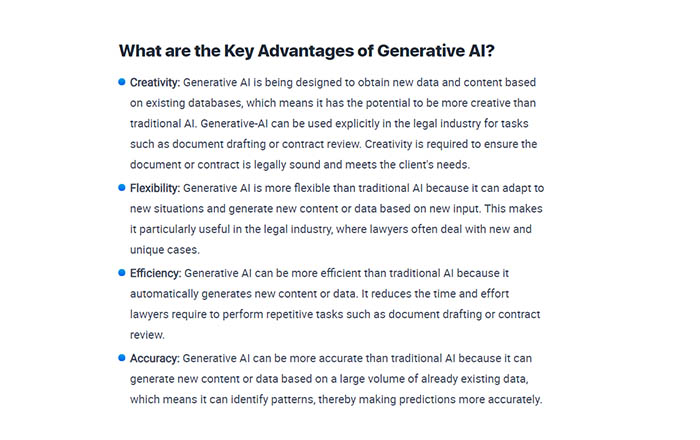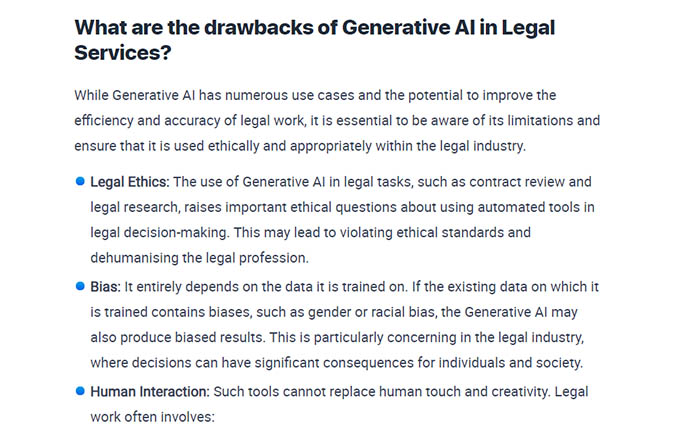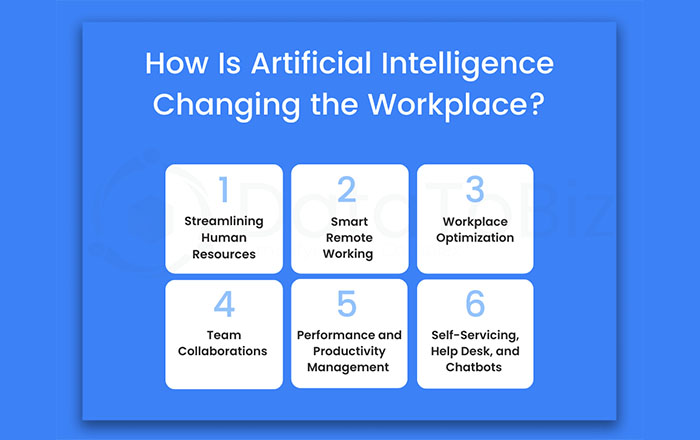In the present digital world, technology is transforming all sectors. So too, is it making deep inroads into the legal world, enhancing and expediting both routine and complex tasks undertaken by in-house counsel teams.
This blog focuses on a particular computing invention known as “Generative AI,” a relatively new artificial intelligence technology that empowers businesses to undertake tedious processes quickly and more accurately aided by machines rather than lawyers.
We explore how generative AI can unlock added potential for in-house counsel teams while illuminating any possible challenges or ethical considerations attached to it. By contemplating the advantages of this technology as well as the implications of integrating it into practice law processes, we are better equipped to take advantage of available technologies without compromising human values.
Understanding Generative AI

Generative AI is a software technology that creates data and content in a fashion that can teach the system more with each generation. Rather than telling it precisely what to do, generators provide general parameters allowing them to learn independently by exploring an unrestricted range of possible solutions.
Generative AI employs self-teaching algorithms and uses deep learning techniques. It can be used for tasks, such as image processing, natural language processing, drug discovery simulation, mathematical optimization, and several other problem-solving applications.
Alongside its ever-growing process automation capabilities, generative AI has become increasingly important in fields ranging from logistics and finance to healthcare and cybersecurity.
Applications of generative AI in various industries, including law
Generative AI is a type of artificial intelligence technology capable of generating new content autonomously. It can learn from existing material and create brand-new data adapted to meet specific criteria.
In the legal industry, this form of AI enables faster research, document drafting, contract analysis, and other activities normally handled by human lawyers. Generative AI programs are used for automated legal document generation, jurisdiction-specific document review, and intelligent suggestions when negotiating contracts.
The potential applications of generative AI in the law range from knowledge graphing to understanding nuanced user queries.
It’s being utilized in many countries with success. Diverse industries such as banking and finance can all take advantage of generative AI’s superior predictive capabilities.
How generative AI differs from traditional AI tools
Generative AI is a form of Artificial Intelligence that can generate unique results such as text, images, or sound from code.
Unlike traditional AI tools like machine learning and deep learning, which are used primarily to solve one set problem, generative AI can “think” outside of the box when creating original work by predicting what will likely happen given a certain set of inputs.
It goes beyond merely aiding decision-making within predefined rules; its capabilities allow it to make novel insights. Furthermore, unlike deep learning models that need pre-labeled data for accuracy and correctness, generative AI solutions use unstructured data sets, leading to more accurate predictions due to their lack of constraints on available information pathways.
Advantages of Integrating Generative AI in Legal Practice

Enhanced legal research capabilities
Generative AI offers a range of advantages for legal practitioners in their day-to-day operations. One of the key benefits is its enhanced capability for conducting legal research tasks.
Generative AI leverages natural language processing tools to literally interpret and summarize multiple documents containing legal expertise within seconds, replacing laborious manual processes which take days.
It gives lawyers access to real-time data from structured (courthouse records) and unstructured (published cases) sources, allowing them to quickly and accurately organize it into useful information quickly and accurately.
This provides insights on current developments in legal issues and potential pivotal points for decision-making that would traditionally take many hours or days to collate manually.
Time and cost-efficiency in drafting legal documents
Integrating generative AI technology into legal practices can help to improve time and cost efficiency in drafting legal documents.
Generative modeling technologies can quickly read contract clauses, distill them into their components, interpret the relationships between those elements, and ultimately use that knowledge to generate customized, legally compliant documents based on user needs.
This automates much of the contract writing process and leads to fewer errors or audits and shorter reviews/approval times — all while saving considerable money spent on manual labor. Drafting agreements using generative AI thus significantly improves the productivity of both an organization’s human resources and financial capital.
Improved contract analysis and management
Improved contract analysis and management is one of the significant advantages of integrating generative AI in legal practice.
Generative AI tools employ Natural Language™ processing, or NLP, capable of extracting meaning from a vast range of contracts. Through AI-powered analytics, lawyers can access concisely summarized key information like likely outcomes or relevant obligations with unprecedented speed and accuracy.
Updated search mechanisms enable users to rapidly track down critical points reached across all stages during negotiations. Additionally, automation also helps eliminate administrative costs and trivial, time-consuming tasks that often distract the proper execution of strategic decisions by in-house counsel teams.
Mitigation of human error and bias in legal tasks
Generative AI offers the legal sector a valuable tool to reduce human error and bias when making and executing decisions. Generative AI automates ancient decision models by providing more comprehensive analysis powered by machine learning algorithms that can detect patterns in data sets without any prior programming.
This reduces the time it takes for legal professionals to stay updated on regulations as they change or across global jurisdictions.
Generative AI also assists in detecting previously overlooked discrepancies in the language used throughout documents which would have gone unnoticed if worked on manually. In addition, policy compliance becomes faster and more accurate as errors are quickly identified before any damaging outcomes arise.
Therefore, the implementation of generative AI helps standardize input calculation while increasing efficiency and cost-effectiveness within legal work.
Challenges and Ethical Considerations

Potential risks associated with using generative AI in the legal sector
When introducing generative AI into the legal sector, organizations must ascertain that potential risks are mitigated, and appropriate consideration for various ethical implications arising from automation is prioritized.
The main challenges associated with using generative AI in the context of legal practice arise from its reliance on past big data which may contain inherent biases; moreover, any errors or unintended issues in generated outputs can carry both commercial and reputational impacts.
Also key to its successful adoption is reinforcing compliance regulations concerning usage, storage, and accessibility patterns when organizational staff deploy automated tools for conducting lawyers’ tasks.
Ensuring data privacy and confidentiality
The release of data generated by generative AI technologies in legal practice can be vulnerable to infringement, unauthorized access, and misuse by untrustworthy actors.
Data creators should be given full control over how their protected information is handled during AI processing; they must also have a certain degree of trust in the organization handling their sensitive data.
To ensure data privacy and confidentiality in accordance with applicable laws or data protection regulations, organizations should strive to create well-implemented security solutions that depend on legitimate client identifications as protective measures against unauthorized personnel.
Organizations should also secure intelligently generated textual documents for better all-around safety when organizing economic endeavors.
Addressing ethical concerns related to AI-generated content
Addressing ethical concerns related to AI-generated content is essential in integrating generative AI into legal practice.
Investigating the products’ algorithmic biases and implementation strategies are key practices while reducing any scope for optimization from problematic data sources should be observed.
Further issues can arise, such as fairness to citizens/consumers — questions we hope can be tackled by democratic debates between lawyers, decision-makers, technologists, ad scholars within this realm of development ethics surrounding artificial intelligence.
Impact on In-House Counsel Teams

Streamlined workflow and increased productivity
Integrating generative AI technology into in-house counsel teams enhances their productivity by utilizing AI capabilities to automate and streamline legal hurdles.
By expediting mundane tasks like processing data sets and contract analysis/analytics, which involve cognition-related activities, in-house lawyers have more time for problem-solving associated with more complicated contracts.
In-house teams can then add significantly broader value to businesses compared to before.
Empowerment of legal professionals to focus on higher-value tasks
Integrating generative AI technology with in-house counsel teams enables legal professionals to focus on the more valuable aspects of their job.
By relying on AI tools for daily operations such as analytic research, preliminary forms, and regulations assessments, drafted documents can be completed faster and with less effort.
This makes it possible for in-house counsels to spend their time working on tougher and higher value tasks such as structuring and reorganizing complex contracts or eliminating existing conflicts—valuable results than before could not be reached by old law modeling executions alone.
Transforming the role of in-house counsel in organizations
The role of in-house counsel is rapidly being transformed by adopting generative AI technology.
By leveraging state-of-art AI to automate tedious, administrative tasks, generative AI enables in-house counsel teams to focus on higher-value tasks such as developing novel legal strategies or devising high-impact campaigns.
Automation also helps team members adapt and think critically—freeing up resources and empowering them with decision-making power over higher-impact initiatives.
Generative AI furthermore shifts commercial law away from traditional staffing models towards interdisciplinary approaches involving technically advanced guidance and improved performance of the corporate legal function.
Successful Integration of Generative AI
Identifying suitable use cases for generative AI within the team
Integrating generative AI successfully into in-house counsel teams starts by identifying useful and realistic use cases that give value to daily tasks. Issues such as compliance reviews, contract negotiation tracking systems, and research analysis can benefit from the application of dynamically generated text.
By assessing the law firm’s frequently queries areas, potential use cases for the technology may be identified corresponding to current workflows and processes similarly evaluated.
Leveraging human knowledge and machine refinement further streamlines rules efficiently in various stages or steps of decision-making across legal operations teams.
Selecting the right generative AI tools and platforms
Selecting the right generative AI tools and platforms to integrate into existing legal operations is key for successfully implementing such technology.
Generally speaking, organizations should consider user-friendly solutions which will not require excessive training.
It is also vital for firms to conduct demos with multiple teams and assess different vendors to identify the ones that present suitable features capable of satisfying their needs in terms of cost benefits analysis, timeline assessment, and ease of use.
Furthermore, security, data management capabilities, and scalability must be systematically considered.
Training and upskilling in-house counsel to adapt to AI integration
Considering the broad range of functions available to machine learning algorithms and artificial intelligence technologies, upskilling in-house counsel can be crucial for successfully integrating generative AI. Legal professionals must be adequately prepared to utilize AI tools while understanding their practical applications.
Effective training methods such as e-learning modules, webcasts, mock trials, and laboratories can equip lawyers with important technical knowledge about implementing automated tasks professionally.
In addition to foundational learnings about current standards on privacy protection and ethical implications, this technical competency also enhances problem-solving capacity by sharpening human cognitive skills that are extraneous from elemental computation skill requirements.
Collaboration between legal experts and AI technology specialists
For generative AI to be successfully integrated into the legal sector, meaningful collaboration must occur between law professionals and AI technology specialists.
Lawyers should solicit technical advice in determining ideal use cases for generative AI while technology experts can lend expertise regarding the selection of appropriate tools and platforms for implementation.
Further, lawyers and tech specialists work together to train end users to make optimal use of the platform. With a qualified team behind them, in-house counsel stands to benefit significantly from adapting well-tailored solutions catalyzed by generative AI into their workflows & increase productivity as a result.
Conclusion
In conclusion, integrating generative AI brings numerous challenges and ethical considerations that legal professionals have to grapple with.
However, if implemented correctly, this technology promises powerful advantages for in-house counsel teams, including enhanced legal research capabilities, increased productivity, and improved contract analysis.
Generative AI can no doubt revolutionize how everyday law is practiced, thereby evolving the role of in-house counsel in organizations.
Ultimately legal professionals must remain apprised of new technological trends while being cognizant of protecting data privacy and upholding ethical standards. By proactively harnessing these tools responsibly, we can power the next-gen approach to legal services.
Featured Image Credit: Photo by August de Richelieu; Pexels; Thank you!


























